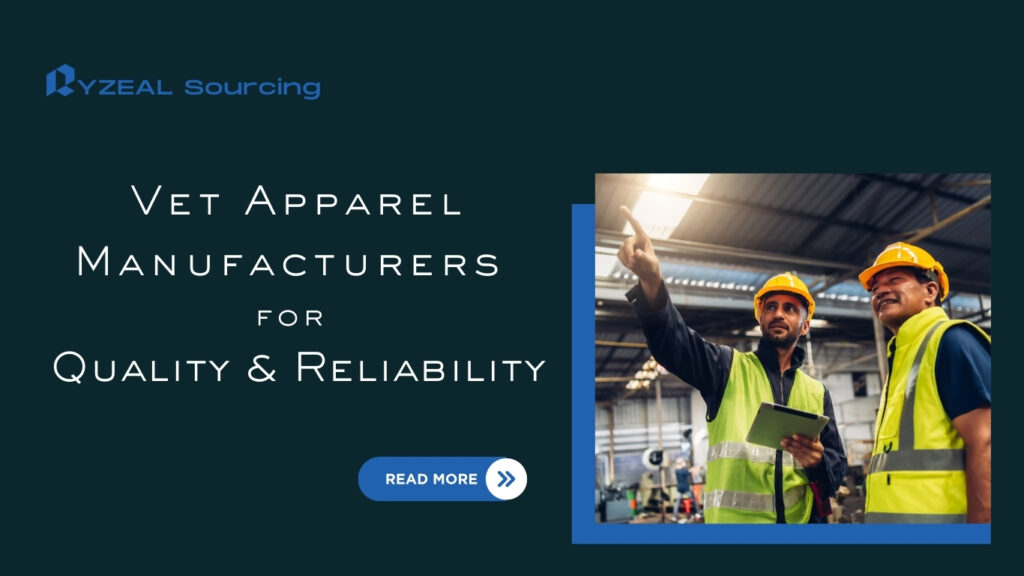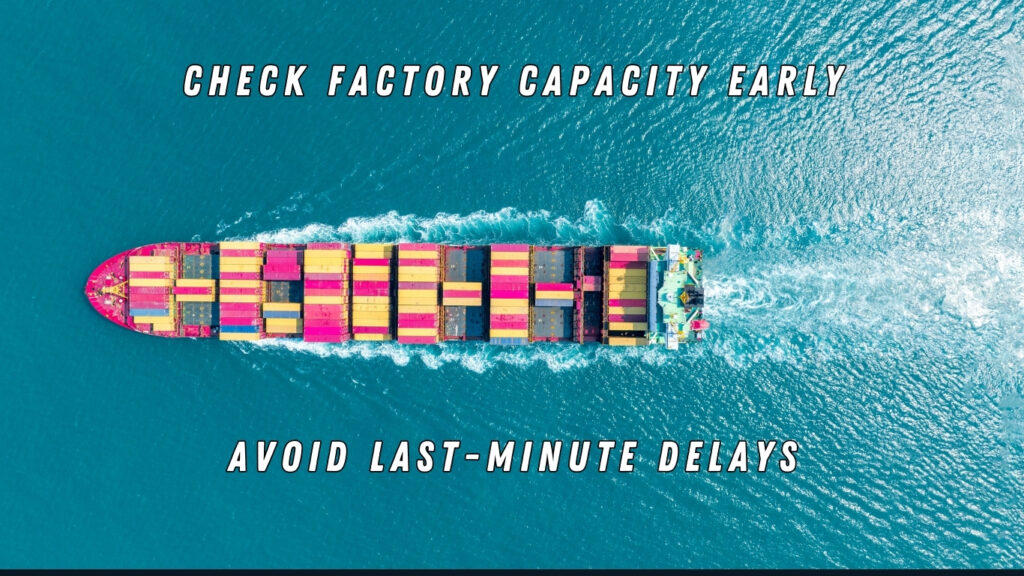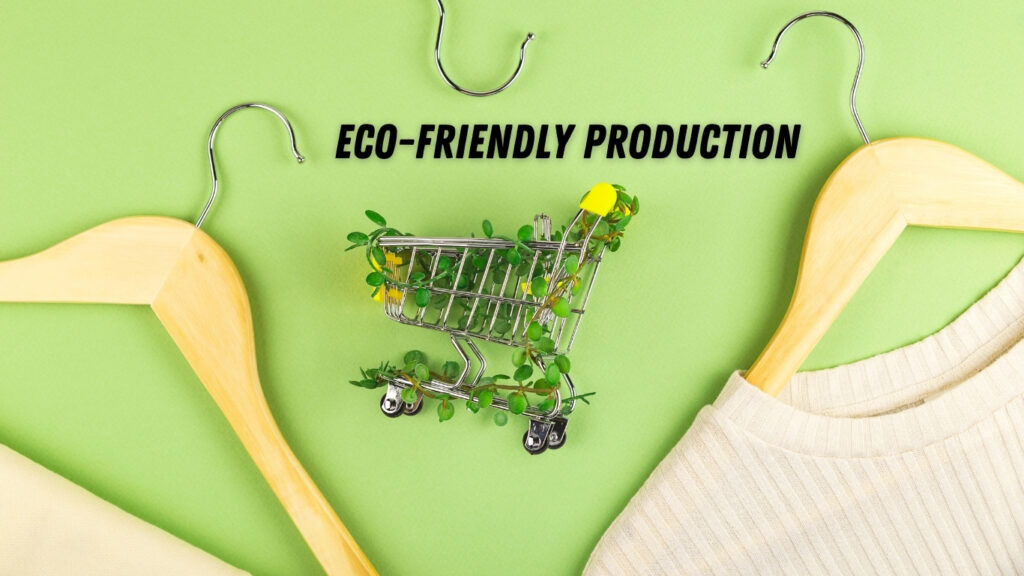
Vetting apparel manufacturers is a crucial step for brands, retailers, and importers looking to ensure high product quality, ethical production, and timely deliveries. Selecting the right apparel manufacturer can make or break a business—while a poorly vetted supplier can lead to quality defects, production delays, compliance risks, and financial losses.
With global manufacturing hubs spanning Asia, Europe, and the Americas, brands must conduct thorough vetting processes to identify reliable and high-quality manufacturers. This guide outlines the essential steps to vet apparel manufacturers, covering factory audits, compliance verification, quality assessments, and supplier reviews.
1. Research & Initial Screening of Manufacturers
Before engaging with a manufacturer, conduct an initial screening to filter out unreliable suppliers. Key factors to assess include:
- Years in business—established factories have proven track records.
- Factory location—sourcing from the right region impacts costs and lead times.
- Past clients and industry reputation—request references from known brands.
- Product specialization—ensure the factory has expertise in your product category (knits, woven, denim, activewear, etc.).
Online supplier directories¹ such as Alibaba, ThomasNet, and Maker’s Row can provide detailed supplier profiles for initial vetting.
2. Factory Certifications & Compliance Checks
A reliable apparel manufacturer must comply with global production standards² to ensure ethical sourcing, worker safety, and environmental responsibility. When vetting manufacturers, request the following certifications:
- BSCI² (Business Social Compliance Initiative)—ensures fair labor conditions.
- WRAP³ (Worldwide Responsible Accredited Production)—verifies responsible production practices.
- GOTS⁴ (Global Organic Textile Standard)—certifies organic textile production.
- OEKO-TEX⁵—ensures textiles are free from harmful substances.
- ISO 9001⁶—sets quality management system standards.
Verifying these certifications ensures the factory operates under legal and ethical standards, reducing risks for brands.
3. Conducting Factory Audits & On-Site Inspections
Factory audits provide firsthand insight into production capabilities, working conditions, and quality control processes. There are three main types of audits:
A. Social Compliance Audit
- Checks worker safety, fair wages, and legal labor practices.
- Ensures no child labor or forced labor violations.
- Confirms worker well-being under BSCI, WRAP, or SEDEX standards.
B. Technical & Production Audit
- Reviews fabric sourcing, garment construction techniques, and finishing processes.
- Ensures machinery and technology are up to industry standards.
- Evaluates in-house vs. outsourced production to assess quality control consistency.
C. Quality Control Audit
- Examines fabric defects, stitching strength, and final garment inspections.
- Reviews factory adherence to brand-specific quality control requirements.
- Implements AQL (Acceptable Quality Level) inspection protocols.
Using third-party inspection services⁷ like SGS, Bureau Veritas, or Intertek ensures a neutral evaluation of manufacturer reliability.
4. Assessing Manufacturing Capacity & Lead Times
A manufacturer’s ability to meet production deadlines is crucial for avoiding delays and supply chain disruptions. Key evaluation areas include:
- Production capacity—check monthly output capabilities.
- Lead time efficiency—confirm turnaround times for sampling and bulk orders.
- Backup production planning—ensure contingency strategies exist for peak seasons.
MOQ (Minimum Order Quantities)—some factories require large MOQs that may not align with a brand’s needs.

Reliable manufacturers provide detailed production timelines to guarantee on-time deliveries.
5. Evaluating Supplier Communication & Responsiveness
Strong supplier communication is essential for problem-solving, order tracking, and production updates. Assess manufacturers by:
- Response time—how quickly they answer emails, calls, and inquiries.
- Language proficiency—ensuring clear communication in English or relevant languages.
- Production updates—checking if they offer real-time tracking systems.
Miscommunication can lead to production errors and shipment delays, making supplier transparency and responsiveness key indicators of reliability.
6. Quality Control & Testing Procedures
To maintain consistent product quality, manufacturers should have strict in-house quality control (QC) measures. Key checkpoints include:
- Pre-production testing—validating raw materials and fabric quality.
- In-line production checks—inspecting garments at different production stages.
- Final product inspection—ensuring garments meet brand specifications.
Third-party lab testing services like SGS or Bureau Veritas can verify:
- Colorfastness & shrinkage resistance.
- Fabric composition accuracy.
- Toxic-free certification for dyes and finishes.
Ensuring quality control compliance prevents defective product shipments and enhances customer satisfaction. You may check out this video about great quality control tools –
7. Analyzing Past Client Reviews & Case Studies
Checking a supplier’s client history helps validate their experience and reliability. Steps to verify include:
- Requesting client references from previous buyers.
- Reviewing online testimonials on sourcing platforms.
- Assessing their experience working with major brands.
Suppliers with positive reviews and industry-recognized partnerships offer greater assurance of reliability.
8. Ethical & Environmental Impact Assessment
Brands must ensure manufacturers align with sustainable and ethical practices. Key assessment areas include:
- Eco-friendly materials & sustainable textile production.
- Waste management & energy-efficient manufacturing.
- Compliance with international sustainability standards.
Factories that prioritize low-carbon production and water-saving technologies align with modern sustainability trends.

A properly vetted manufacturer ensures quality, reliability, and compliance, securing long-term success for apparel brands.
RYZEAL’s Perspective: Ensuring Quality and Reliability in Apparel Manufacturing
At RYZEAL SOURCING, we understand that vetting an apparel manufacturer is not just about finding a supplier—it’s about securing a long-term, strategic partnership that ensures quality, efficiency, and compliance. With over a decade of experience in global sourcing, we have developed a structured vetting process that guarantees high production standards, ethical manufacturing, and seamless supply chain management.
Our approach ensures that the manufacturers we work with meet international compliance, sustainability, and reliability benchmarks, making them trusted partners for global apparel brands. Below, we share our expert insights on how to vet manufacturers effectively.
1. Implementing a Multi-Layer Vetting Framework
A single factory visit isn’t enough to determine long-term reliability. At RYZEAL SOURCING, we conduct multi-stage evaluations before onboarding a new manufacturing partner. Our vetting process includes:
- Factory background checks—verifying ownership, certifications, and past client reviews.
- In-depth facility audits—inspecting production lines, equipment, and worker conditions.
- Material testing & quality control measures—ensuring fabric consistency and garment durability.
- Supply chain transparency reports—confirming material sourcing and ethical labor standards.
This comprehensive approach eliminates sourcing risks and ensures stable production quality.
2. Prioritizing Ethical & Sustainable Manufacturing Partners
At RYZEAL SOURCING, we prioritize ethical and sustainable manufacturers to align with global compliance standards. Our suppliers must meet strict social and environmental regulations, including:
- BSCI¹ & SEDEX² certifications for ethical labor practices.
- OEKO-TEX³ & GOTS⁴ compliance for sustainable fabric sourcing.
- Zero-waste production initiatives that reduce textile waste and water consumption.
- Fair wages and safe working conditions as per international labor laws.
By working with ethically compliant suppliers, we help brands enhance their reputation while maintaining responsible sourcing practices.
3. Factory Audits & On-Site Production Oversight
We believe that a factory’s real capability is assessed through hands-on evaluation. RYZEAL SOURCING ensures:
- Scheduled and surprise factory visits to monitor production consistency.
- Third-party audits by SGS, Bureau Veritas, and Intertek for unbiased assessments.
- Real-time quality inspections at every stage of manufacturing to prevent defects.
Our on-ground production oversight allows us to detect potential production bottlenecks early, ensuring brands receive flawless garments on time.
4. Supplier Communication & Crisis Management
Supplier responsiveness and problem-solving ability are critical indicators of a reliable manufacturer. We evaluate manufacturers on:
- Clear and transparent communication practices—reducing misinterpretation in production.
- Crisis management strategies—how quickly they resolve supply chain disruptions.
Adaptability to market demands—whether they can adjust to urgent orders or new designs.

Through strong communication channels, we ensure seamless collaboration between brands and manufacturers.
5. Leveraging Technology for Quality Control
At RYZEAL SOURCING, we integrate advanced digital tools to monitor supplier performance, including:
- Automated defect detection systems for real-time quality assurance.
- Blockchain-based supply chain tracking for full transparency.
- 3D virtual sampling to reduce sample production waste.
This tech-driven approach enhances efficiency, minimizes errors, and ensures precision in manufacturing.
6. Establishing Long-Term Supplier Relationships
Rather than working with random factories, we focus on building long-term partnerships with manufacturers that consistently:
- Meet production timelines without delays.
- Offer competitive pricing without quality compromises.
- Adapt to new sustainability regulations and innovations.
Our long-term supplier relationships translate into stability, reliability, and continuous improvement in apparel sourcing.
Final Thoughts
At RYZEAL SOURCING, we believe that a carefully vetted apparel manufacturer is the backbone of successful fashion sourcing. By combining strict compliance checks, real-time quality monitoring, and ethical sourcing strategies, we ensure that brands receive exceptional-quality garments with minimal risk.
References
- amfori BSCI. (n.d.). amfori BSCI Compliance Standards. Retrieved from https://www.amfori.org/content/amfori-bsci
- SEDEX. (n.d.). Supplier Ethical Data Exchange (SEDEX) Compliance. Retrieved from https://www.sedex.com/
- OEKO-TEX. (n.d.). OEKO-TEX Certification and Standards. Retrieved from https://www.oeko-tex.com/en/
- Global Organic Textile Standard (GOTS). (n.d.). GOTS Certification Standards. Retrieved from https://global-standard.org/
- WRAP. (n.d.). Worldwide Responsible Accredited Production (WRAP) Standards. Retrieved from https://wrapcompliance.org/
- ISO. (n.d.). ISO 9001 Quality Management System Standards. Retrieved from https://www.iso.org/standard/62085.html
- Intertek. (n.d.). Consumer Goods Testing and Quality Control. Retrieved from https://www.intertek.com/consumer/
- Just Style. (n.d.). How to Choose the Right Garment Manufacturer. Retrieved from https://www.just-style.com/analysis/how-to-choose-the-right-garment-manufacturer/
- SGS. (n.d.). Softlines & Accessories Testing Services. Retrieved from https://www.sgs.com/en/consumer-goods-retail/softlines-and-accessories
- Bureau Veritas. (n.d.). Apparel Quality Assurance and Compliance Services. Retrieved from https://group.bureauveritas.com/
Additional Resources for Further Reading
- Better Cotton Initiative (BCI): https://bettercotton.org/
- Apparel Impact Institute: https://apparelimpact.org/
- Sustainable Apparel Coalition: https://apparelcoalition.org/
